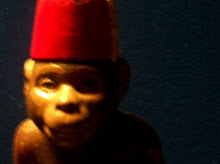The tension that propelled Bellow's work is now mostly absent from American life. On the one hand, you have a generation of students who are educated in a way that doesn't bring them into contact with the European canon, the old "best that has been thought and said." They don't have a chance to push back and assert their own Americanness. On the other hand, there are those in the academic and literary stratosphere who are part of the global circuit of conferences and academic appointments. They seem aloof from or ashamed of America, so they are not driven to define, the way Bellow did, an American identity.I will not deny that particular aspects of the American legacy are deeply problematic. It is utterly impossible for me to deny how painfully American I am. A simple formula for a conflicted self-image. However, I am not one of the academics Brooks describes. I am neither aloof from, nor ashamed of, America.
If I go back through my life to this point and apply some reference labels I get a veritable cornucopia of tried and true Americana.
Philadelphia
the Revolutionary War (growing up where I did it was omnipresent)
baseball
wrestling
early hip-hop (Run DMC, Afrikka Bambatta etc…)
the south
wrasslin
punk rock
race (though to be fair two of the first books I remember reading, long before I moved south, were children's biographies of Harriet Tubman and George Washington Carver, so race had registered while still a wee Yankee)
Johnny Cash
jazz
the civil war
I'm a fucking Ken Burns documentary. Of course I've left some stuff out to make my point. Consider a few of the exclusions:
the Marquis De Lafayette (look, I read a lot of books when I was a kid and somehow he became something of a childhood hero)
soccer
psychiatric treatment
art school
deconstruction
Jeez…I'm practically Jean Paul Noble. But I'm not. Neither list is indicative of the mess that is the whole. It may be that Saul Bellow no longer seems to speak to cultural realities in America; Brooks implies that the tension has been resolved:
American democracy is no longer engaged in an Oedipal struggle with European aristocracy, the way it was from the days of the American Revolution all the way up until Bellow's heyday.I can't quite decide if Brooks is sounding triumphal or regretful here. Or perhaps both. Regardless, I hope Brooks is wrong. Our mess has always been our strength.
We're living in a unipolar culture, and it's lonely at the top.
update: I'd forgotten something I'd posted about Bellow previously. He offers words to live by:
"With increasing frequency I dismiss as merely respectable opinions I have long held - or thought I held - and try to discern what I have really lived by, and what others live by."


